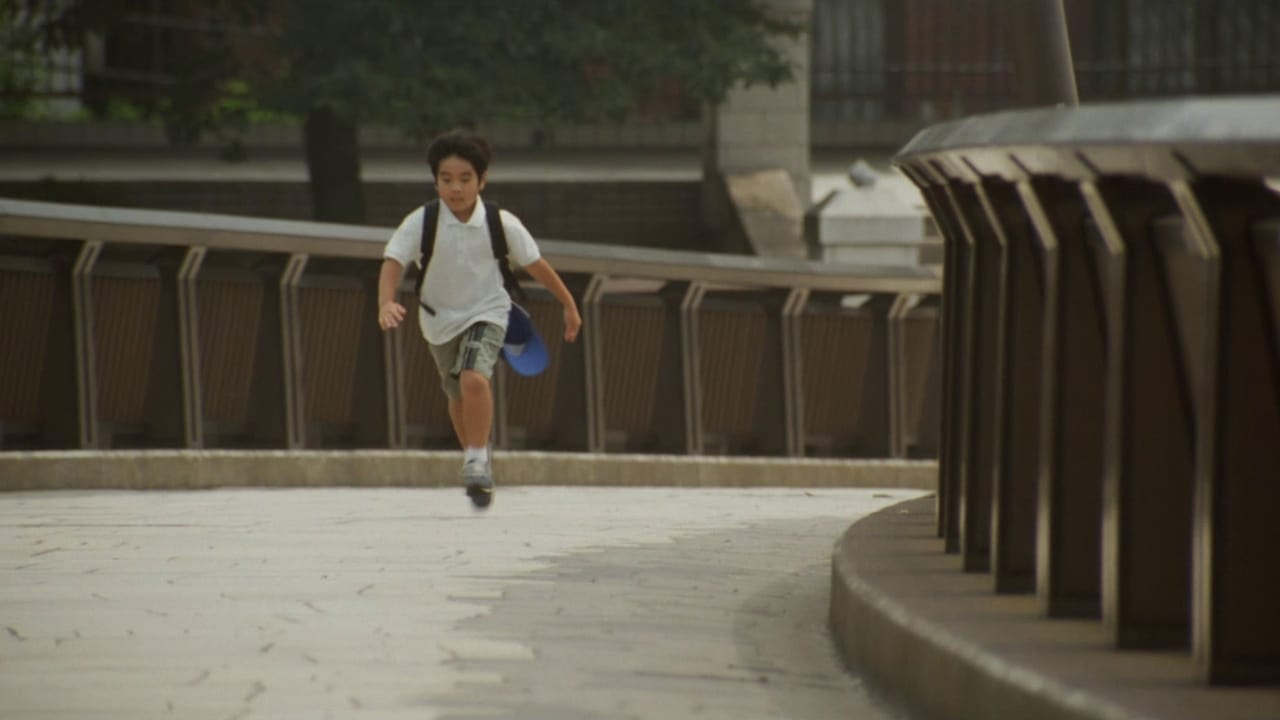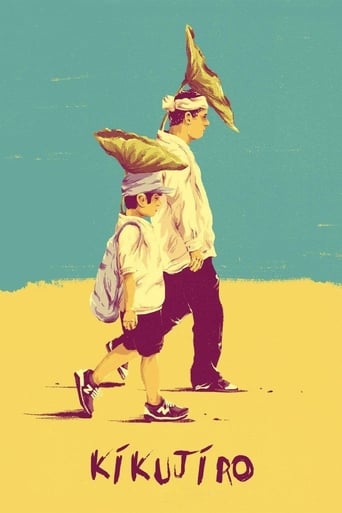

The acting is good, and the firecracker script has some excellent ideas.
... View MoreThis is a small, humorous movie in some ways, but it has a huge heart. What a nice experience.
... View MoreI enjoyed watching this film and would recommend other to give it a try , (as I am) but this movie, although enjoyable to watch due to the better than average acting fails to add anything new to its storyline that is all too familiar to these types of movies.
... View MoreThere is definitely an excellent idea hidden in the background of the film. Unfortunately, it's difficult to find it.
... View More–Whats your name any way– –After a smile he says–Kikujiro–The name was not that important till the end. He was with the boy and he was with us with his ridicule persona and big mouthed nature. By the time when he was about to leave, I was about to ask his name. Masao helped me. Takeshi Kitanos 1999 film is about a young boy searching for his estranged mother in his summer vacation. The journey towards his mother would have remain simple and he could have met his settled mother and his life still would have remain sad only if he had gone to meet his mother alone. Kikujiro went with him and shared a wild misadventure together which changed both of their lives. Kikujiro is an aggressive middle aged crook. He had a overruling wife and a sad mother who had been kept on a old people\s shelter. In his sub–conscious, he had kept enough suffering of his life, accumulating it into next level. Thats why he gets angry , put his foul mouthed conversation into anyone, It is just because he doesn't want to be happy and shows the cynical nature, just because he was suffering. In one of the scenes from the film, when he requests Fatso, the biker to help him get to the old house where he sees his mother sitting lonely on the table. He just watches her and fears to go near to her and spend a whole day in silence. This shows how he had lived his life in a suffocation of alienation. How he had utterly desired to be accepted among the civilized Japanese Society. When he was ignored and alienated from that part of good society, he became a rebel in the form of goons. He had idolized the Yakuza because it was the only way of Solace for him. Masao and Kikujiro takes a wild road trip into a Japanese countryside where they meet Angel like strangers, who in real life were outcast and alienated people. They became friends and share a beautiful childish holiday together. They were all outcast in search of whole happiness. The real and civilized people were portrayed as demons and were treated in a cynical and unromantic nature. The unforgettable things about this film are its characters, like the lonely poet, baldy, Fatso and the soothing soundtrack from Joe Hisaishi. A great film worth watching. Two Thumbs Up! I was wondering why it was not considered for Palme D or at Cannes.Nischal Poudyal
... View MoreI think Kikujiro is mainly about loneliness.Takeshi's character and the boy, Masao, seem really different on the surface. Takeshi's provokes people, is loud and rude. Masao is quiet and sad.But they're really the same person: someone whose life is full of disappointment, abandonment. They both feel isolated, like no one could understand. They might be pitied, but no one could understand like they'd been there, like they'd lived that kind of life.And when you get really lonely like that, I think it makes you bitter. The whole world continues to smile and sing its fortunes while your life seems to get worse and worse, less and less reason to stay living.Masao is very withdrawn because of this. Over time, as he gets older, I can see him getting more and more bitter about it. Maybe Takeshi's character was like Masao at first, too. Lonely and sad. And then maybe he thought, "why should I be sad? All the world has brought me is misfortune. I should rather be angry!" and then started trying to provoke and anger people on purpose. Why should they be content, anyway? But, all the other characters they meet on the journey are like that, too. Isolates, people on the edge of society, people who might call themselves "countercultural" or something like that. What I think is really important is how they change over the course of the movie. Like they might have the liberty to sit around all day, smoking and brooding and depressed. Masao is only a child, and all this kind of disappointment is new to him.In a less realistic film maybe the characters would be, in their characteristic brooding way, like, "Eh, them's the breaks huh kid". In Kikujiro they're people. They can see how much he's like them, how much pain he's in. And they're so jaded because they're still hurting, too.So they try and cheer him up, play games with him. Show him the kind of love he never got from anyone else in his life, that they never got. And it's so touching because they, especially Takeshi's character, start to see it's not so bad, not so hopeless. That everyone loves, and everyone cries, and just because their lives have been particularly worse than others doesn't mean they can't reach out to and come to an understanding with others.The film's long takes sometimes feel kinda pointless, like they're just there because that's part of the director's style. But other times they really work, especially in the more emotional scenes. They help say more than any amount of ridiculous sad symphonic music could.And the music, which is intermittent and plays on a single theme, is really good too. It doesn't feel like some kind of deliberately tragic cliché, but still adds a great amount to the mood of the movie and helped bring me to tears at some points.Some negative reviews I've read call Kikujiro shallow or emotionally manipulative, but I can't see that at all. The whole thing is very human, and doesn't force any moral down your throat other than that, I guess, that you are not so alone. And it feels like it's coming from someone who has been alone, who has felt this incredible sadness, and also conquered it. And I think, that means more than I can really put into words.
... View MoreI have heard a lot of people said that this film was not recognized as much as his other films. What a shame! When I saw the tittle of the film, I was surprised. The tittle is Kitano's father name.In Kitano's biography, it is said that "Kitano's father was an alcoholic and would spend most of the money he earned on alcohol, and when he had been drinking, he would become violent and beat up both his wife and his kids. Eventually, Kikujiro left his family".I know Kitano Takeshi made this film because he has been tired of violence/gangsters/life&death in his previous film, but what made him writing a story about his father-a man who abandoned his family when Kitano was young. If you read Kitano Takeshi's biography, you should see his childhood memory in Masao. Kikujiro ( in the film) is a corrupted person. But also in the film, Masao eventually respects and loves to play with that childish man who keeps smoking and shouting at people. Does Kitano himself desire a father too much, so he is willing to accept his father's bad habits as long as his father is still at his side.It is not really a film I'd say, I feel like I am seeing the characters in real life. From the start, Masao has drawn Kikujiro in his diary. The ending is also the beginning. Kitano didn't make a happy ending nor a sad ending. Our 3 hours is just to see the beginning of a father-and-son relationship which would grows by the time. Remember, Masao just knew Kikujiro's name in the end of the film, and Kikujiro said: "Let's do it again some time". The cycle of life in "Kikujiro" go on forever. The feeling is too real. I have forgot that I were watching a movie. There is no simple words that can describe this movie completely, u have to watch it by yourself
... View MoreThe last Kitano Takeshi movie for the day, Kikujiro is very much unlike the previous two movies. If anyone would think that Takeshi is only famous for, and can make only violent movies, then this one would make you do an about turn. Even the narrative style is quite different from the limited few of his movies I've been exposed to. Being PG rated (Hana-Bi was NC16), the queue of those expected to watch this film was again snaking, even though most of the (free) tickets were already snapped up.The story centers on the deep friendship which develops between a quirky, mean and uncouth middle-aged man, and a young boy. It doesn't start off rosy, as Kikujiro (played by Takeshi himself) gets assigned, against his wishes, chaperon duties to assist and ensure that the young boy Masao (Yusuke Sekiguchi) gets to find his mother. So begins a road trip of sorts, with the duo encountering a host of situations and characters (aren't road trips all like that?)The movie can be seen as two distinct halves, with the first half in my opinion the more superior portion of the film. It centers upon the journey, on the quest to seek out Masao's mother in another county. We get to follow our mismatched duo through various escapades through their hitchhiking adventures, with one involving racing amongst cyclists (in a betting game), which is one of my favourite moments in the story. Everything else afterwards in this half is built up from that one incident, adding much to the comedic aspects that actually, although predictably, bring on some genuine laughs.The second half is perhaps what disappoints, with its introduction of over the top characters in 2 biker gang type guys, and a farmer. Here, the sequence of events sticks out unconvincingly, even though it's possibly trying to tug at your heartstrings and bring back memories of the days of childhood, where you have adults engaging in children's games, just to keep the children entertained. The play acting with strangers take its toil as it wore on, and became a bit of a drag with repetitive childish scenes of play acting. Takeshi isn't adorable, try as he might, and some may cringe at his "act cute" moments. Somehow Yusuke Sekiguchi, who plays Masao, doesn't seem to act cute at all, and I thought it was kind of mirroring real life - imagine between a baby and an adult, who's the one playing the fool most of the time in their interactions with each other?Nonetheless, Kikujiro is still an admirable story on friendship, amongst the unlikeliest of couples, with Kikujiro cutting a father like figure to Masao's little child. Come to think of it, it's like a road trip movie between father and son, and the braving of odds to cement some credible ties by the time the end credits come rolling.
... View More